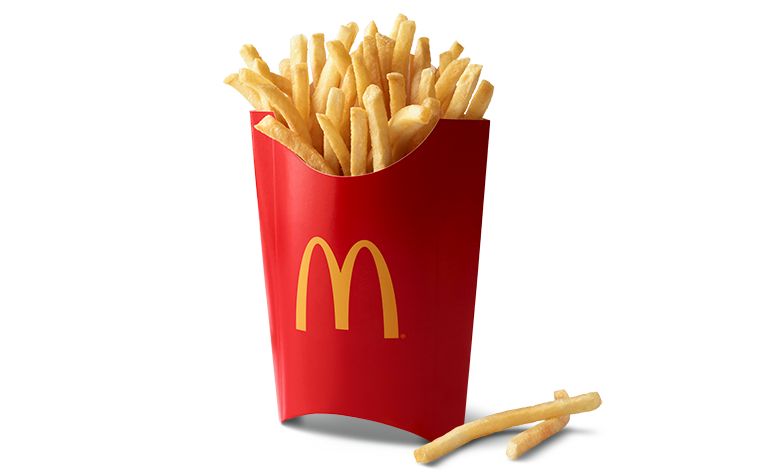Wondering about the calorie count in McDonald’s fries? Look no further! In this blog post, we will delve into the transparency of McDonald’s ingredient information and explore the nutrition facts that often go beyond the eye’s grasp. Our main focus will be on the beloved McDonald’s fries, as we uncover the precise calorie content and provide you with a comprehensive nutrition guide. So, if you’re curious about the nutritional breakdown of these iconic fries, get ready to satisfy your cravings for knowledge. Let’s dive in and discover the secrets behind McDonald’s fries’ calorie count.
Transparency in McDonald’s Ingredient Information: A Closer Look

mcdonalds fries
McDonald’s Corporation, a global fast-food powerhouse, has always been synonymous with its golden, crispy fries. These fries have become a staple in the fast-food landscape and are a beloved favorite of many. However, in today’s health-conscious society, it’s not just about the taste, but also about what goes into the food we consume. This is especially true for individuals who are mindful of their calorie intake or have specific dietary restrictions.
Recognizing this need for transparency, McDonald’s has taken significant strides to provide its customers with complete and accurate ingredient information. This commitment is not just a corporate responsibility; it’s a testament to McDonald’s dedication to its customers. It’s about ensuring that every customer, regardless of their dietary needs or restrictions, can make informed decisions about the food they consume.
As part of this commitment, McDonald’s has made it clear that they do not endorse any of their US menu items as Halal, Kosher, vegetarian, vegan, or gluten-free. This is an important distinction as it underlines the need for customers to exercise personal discretion when it comes to their dietary choices. It is a reminder that while McDonald’s provides the information, the decision ultimately lies with the customer.
Despite this, McDonald’s continues to strive for transparency in its ingredient information. They have made their nutritional information readily available online and in their restaurants, providing customers with the details they need to make informed dietary decisions. Whether you’re counting calories or just curious about what goes into your favorite McDonald’s fries, this commitment to transparency ensures that you have the information you need at your fingertips.
In a world where consumers are becoming more conscious of their food choices, this level of transparency from McDonald’s is not just commendable, but necessary. It shows a respect for customers and their individual dietary needs, fostering a relationship of trust and openness. And in the end, isn’t that what we all want from the brands we love?
Nutrition Information: Peeling Back the Layers

mcdonalds fries
At McDonald’s, the quest for nutritional transparency extends far beyond the surface. They understand that their customers are not just concerned with what meets the eye but also what lies beneath. For instance, when it comes to the beverages they serve, the standard fill levels, inclusive of ice, form the foundation for estimating the calorie content of these fountain drinks. For those customers who are more meticulous about their calorie intake, McDonald’s has made it easy to access beverage calorie information without ice. All they need to do is refer to the sign posted conspicuously at the beverage fountain.
The nutrition information provided by McDonald’s is not randomly derived but is based on a comprehensive compilation of ingredient values. These values are not only in strict compliance with FDA regulations but also collected from a variety of reliable sources. These include accredited laboratories that conduct rigorous testing, published resources that are widely recognized for their credibility, and information directly provided by their suppliers.
However, it’s crucial to note that while McDonald’s strives for accuracy, there might be slight variances in the nutrition information due to a number of factors. These factors can range from changes in serving sizes, differences in preparation techniques, variations in product testing, to changes in sources of supply. Despite these potential variations, McDonald’s ensures the nutrition information remains relatively stable, with only a negligible possible variation.
This commitment to providing comprehensive and accurate nutrition information underscores McDonald’s dedication to transparency and their respect for their customers’ individual dietary needs. It’s a testament to their belief that every customer has the right to know what they are consuming, thereby empowering them to make informed food choices.
So, the next time you’re at McDonald’s, remember that the nutrition information you see is more than just numbers. It’s a reflection of McDonald’s commitment to quality, transparency, and customer satisfaction.
Unraveling the Caloric Content of McDonald’s Fries

mcdonalds fries
McDonald’s fries have long been a beloved favorite, their golden crispy exterior and soft fluffy interior making them a staple in the fast-food world. But have you ever wondered about the caloric content of these delectable treats? Let’s take a closer look.
Starting with a basic unit, a handful of McDonald’s fries, which weighs approximately 20g, contains nearly 65 calories. This may seem negligible, but it’s essential to remember that this is just for a small portion. The enchanting taste and texture of these fries often lead us to reach for more, and that’s where the calories start to add up. If you find yourself indulging in a second handful, you’re looking at a total of around 130 calories. And if it’s one of those days when you simply can’t resist, three handfuls would amass to approximately 195 calories. These figures are estimates, but they provide a valuable insight into the caloric intake we commit to with each delicious bite.
When it comes to portion sizes at McDonald’s, a small serving of fries, weighing 80g, contains 258 calories. If you opt for a medium portion, you’re consuming 371 calories, and a large portion, which weighs 150g, clocks in at a hefty 485 calories. These figures correspond to the weights of the fries, so it’s easy to keep track of your calorie intake based on the portion size you choose. If you liked this topic you should also check out and find out how many calories does McDonalds sausage biscuit have?
Understanding the caloric content of McDonald’s fries is crucial in maintaining a balanced diet and making informed food choices. While they’re undoubtedly tasty, it’s essential to consume them in moderation, given their high calorie count. Remember, knowledge is power, and being aware of the nutritional content of the food you eat is a step towards healthier eating habits.
Unveiling the Nutritional Profile of McDonald’s Fries
When it comes to indulging in fast food, McDonald’s fries often top the list. These golden, crispy delights are a global favorite, but have you ever wondered about their nutritional profile? Let’s delve deeper into the caloric content of these famous fries, which can vary based on the portion size.
Starting with a single handful of McDonald’s fries, which weighs around 20 grams, you’re consuming approximately 65 calories. This might not seem much, but remember, this is just for a handful. If you’re someone who tends to grab two handfuls, you’re doubling the caloric intake to 130 calories. And if you can’t resist reaching for a third handful, you’re looking at around 195 calories.
Now, let’s consider the standard serving sizes at McDonald’s. A small portion of fries, weighing about 80 grams, contains around 258 calories. If you opt for a medium portion, which weighs approximately 115 grams, you’re consuming about 371 calories. For those who can’t resist a large portion of McDonald’s fries, weighing around 150 grams, be prepared to consume a whopping 485 calories.
It’s important to note that while these figures provide a general guide, the actual caloric content can vary slightly due to factors such as preparation methods and serving sizes. However, McDonald’s commitment to transparency ensures these figures remain relatively accurate.
Understanding the nutritional information of what we consume can be a powerful tool in making informed dietary choices. It’s not about completely eliminating our favorite foods, but rather about being aware and balancing our intake. So, the next time you’re enjoying those delectable McDonald’s fries, keep these figures in mind.
Remember, knowledge is power, especially when it comes to nutrition. So, stay informed, make wise choices, and continue to enjoy your food with a new sense of awareness.
Decoding the Nutritional Profile of McDonald’s Fries
When you dive into the nutritional breakdown of McDonald’s fries, you’ll find that a 100-gram serving contributes around 323 calories. While this might seem like a hefty number, it’s essential to understand what these calories are made up of.
The protein content in this portion size of fries is approximately 3.41g. Although fries aren’t typically viewed as a protein source, this amount can contribute to your daily protein intake. However, it’s important to note that fries shouldn’t be your primary source of protein, as they lack the full spectrum of essential amino acids found in other protein-rich foods like meat, dairy, and legumes.
As expected, McDonald’s fries are rich in carbohydrates, with about 42.58g per 100g. Carbohydrates are a primary source of energy for our bodies, and while they often get a bad rap, they are necessary for our bodies to function optimally. However, moderation is key, and understanding the carbohydrate content of the foods we consume can help us manage our daily intake.
The fat content in McDonald’s fries is around 15.47g per 100g. While fats are an essential part of a balanced diet, providing energy and supporting cell growth among other functions, it’s important to remember that not all fats are created equal. The fat in fries is primarily in the form of saturated fat, which, when consumed in excess, can lead to health issues like heart disease.
For the health-conscious eaters among us, these numbers can act as a helpful guide in determining portion sizes and adjusting caloric intake. However, it’s crucial to remember that these values are estimates and can vary slightly depending on preparation methods and serving sizes.
Knowledge is power, especially when it comes to the food we consume. Understanding the nutritional content of our favourite foods, like McDonald’s fries, empowers us to make informed choices, indulge mindfully, and maintain a balanced diet. Learn all about when does McDonalds serve lunch and enjoy your fries.
So, the next time you’re at the Golden Arches, remember these facts and enjoy your fries in moderation. Happy mindful indulging!
FAQ & Users Questions
How many calories are in McDonald’s fries?
One hundred grams of McDonald’s fries contain approximately 323 calories. A handful of McDonald’s fries (20g) contains about 65 calories. Two McDonald’s fries have about 130 calories, while three have about 195 calories. McDonald’s small portion (80g) contains 258 calories, medium portion (115g) contains 371 calories, and large portion (150g) contains 485 calories. For more details on different measurements and their calorie content, please refer to the table in the article.
Is the calorie information provided by McDonald’s accurate?
The calorie information provided by McDonald’s is based on testing conducted in accredited laboratories, published resources, or information provided by suppliers. However, it is important to note that there may be variations in serving sizes, preparation techniques, product testing, and sources of supply, which can affect the nutrition values for each product.
What other nutritional information is provided for McDonald’s fries?
In addition to calories, McDonald’s fries contain 3.41g of protein, 42.58g of carbohydrates, and 15.47g of fat per 100g.
Are McDonald’s fries suitable for specific dietary needs, such as being vegetarian, vegan, or gluten-free?
No, McDonald’s does not certify or claim any of its US menu items, including fries, as Halal, Kosher, vegetarian, vegan, or gluten-free. It is important to consider your dietary restrictions and preferences before consuming McDonald’s fries.
